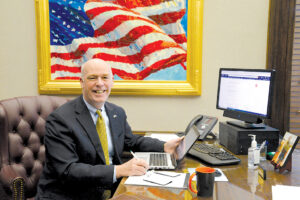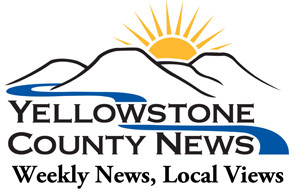
Newly sworn into office, Montana Governor Greg Gianforte removed his mask to pose for a picture in anticipation to sign legislation, that will help small businesses in Montana deal with Covid-19 concerns, open back up and get back to work. Part of the legislation Gov. Gianforte is supporting includes his pro-jobs budget, and roadmap to the Montana Comeback plan.
(Photo by Jonathan McNiven)
As the bill that would eliminate liability for businesses regarding contracting COVID-19, makes its way through the state legislature, Governor Greg Gianforte is waiting for it to land on his desk. He has promised that as soon as he can sign SB65 and know that vaccinations are being widely distributed in the state, he will lift the mask mandate.
SB65 was introduced by State Senator Steve Fitzpatrick, R-Great Falls, and so far, has made it through the Senate and third reading in the House. Prior to the start of the Legislative session, Montana NFIB reported in their survey of business owners, 96.8 percent said protection from frivolous lawsuits due to COVID-19 should be a top legislative priority.
Besides addressing the potential liability of a wide range of owners or supervisors, the bill addresses the issue of requiring vaccinations.
A business or organization, health care provider or manufacturer cannot be held liable for causing death or injury of an individual unless it is through an act or omission that constitutes gross negligence, willful and wonton misconduct or intentional harm.
The bill also addresses the issue of enforced vaccinations, stating, “If a federal or state statute, regulation, order, or public health guidance related to covid-19 recommends or requires a vaccine, an individual is not required to receive a vaccine, and a person is not required to ensure employees or agents are vaccinated to meet the standard of care.”
Concerns that the legislation could wind up boomeranging into forcing compliance with health orders or mandates, which are not currently enforceable, is allayed with specific wording that says a person “may assert as an affirmative defense” that they took reasonable measures consistent with a federal or state statue”, etc., but “This section may not be construed to impose liability on a person for failing to comply” with such laws or regulations.
At third reading, the draft showed that language had been struck out pertaining to “safe harbor” for situations in which the premises owner was in “compliance with regulations, executive order, or public health guidance,” indicating that that clause aimed at enforcing compliance had been rejected by legislators.
The bill further makes clear, “A government order, regulation, or PUBLIC HEALTH guidance related to covid-19 may not create and may not be construed to create a new cause of action against any person….”
It also states that a person is not required to ensure that others comply with mandates or orders to wear masks. Nor — even if it is mandated by one pubic entity or another — are they required to conduct temperature checks before allowing a person to enter a premises if the individual refuses to allow a check.

